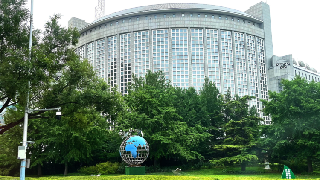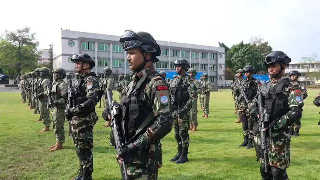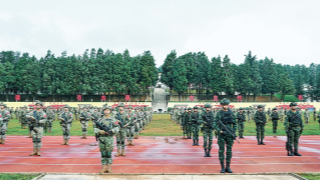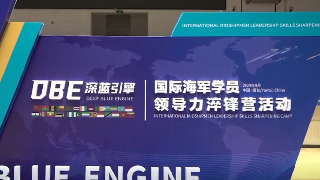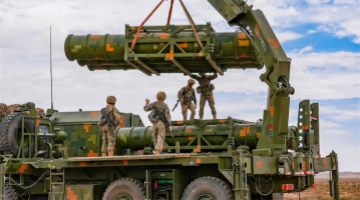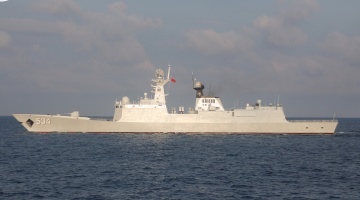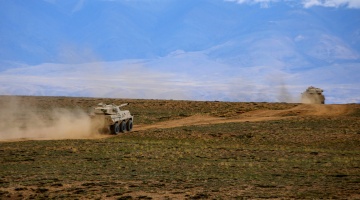On the afternoon of August 16, spokesperson for the Ministry of National Defense Senior Colonel Zhang Xiaogang answered recent media queries concerning the military.
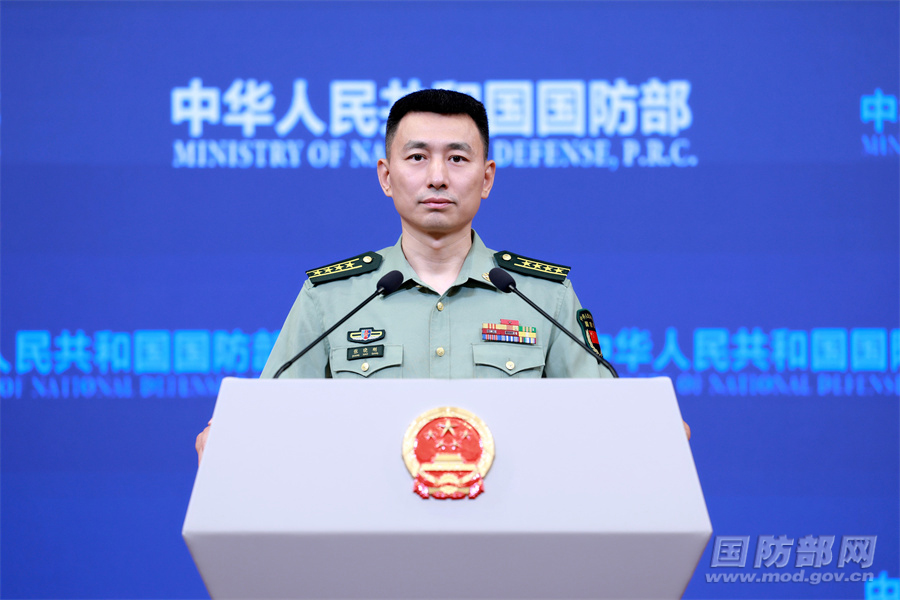
Senior Colonel Zhang Xiaogang, spokesperson for the Ministry of National Defense (MND) of the People's Republic of China (PRC), answers recent media queries concerning the military on the afternoon of August 16, 2024. (mod.gov.cn/Photo by Lv Zhe)
(The following English text is for reference. In case of any divergence of interpretation, the Chinese text shall prevail.)
I have three pieces of news at the top.
The first one.
According to relevant annual plans, PLANS Po Lang sailing training ship will conduct midshipmen ocean-going training, visit countries including Vietnam, Indonesia, Sri Lanka and Singapore, and make a technical stop at Hong Kong from mid August to late November. This mission is aimed at enhancing professional capabilities of midshipmen, strengthening exchanges, cooperation and mutual trust between the PLA Navy and navies of destination countries, and contributing to the building of a maritime community with a shared future.
The second one.
The final of the Military Translation Challenge of the Chinese Armed Forces will be held at the International Studies College of National University of Defense Technology in late August. The contest was officially launched this May with thousands of participants signed up. More than 200 contestants came through the intense preliminary and semi-final rounds. This event is a solid step to implement Xi Jinping Thought on Strengthening the Military and improve defense language capabilities. It is the first multilingual, multitrack translation competition held by the Chinese military. The goal is to step up training and capability building through military-wide competitions to enhance combat readiness.
The third one.
At the invitation of the International Military Sports Council (CISM) and the Venezuelan military, a PLA sports delegation will participate in the 4th CISM World Cadet Games to be held in the second half of August in Venezuela. This will be the first time that China, an important member of CISM, send a delegation to participate in theWorld Cadet Games. The goal is to promote sport in Chinese military academies by learning experience from foreign counterparts, and further boost international military exchanges and cooperation. Founded in 2010, the World Cadet Games is a comprehensive sports event under the framework of the CISM and its most important event this year.
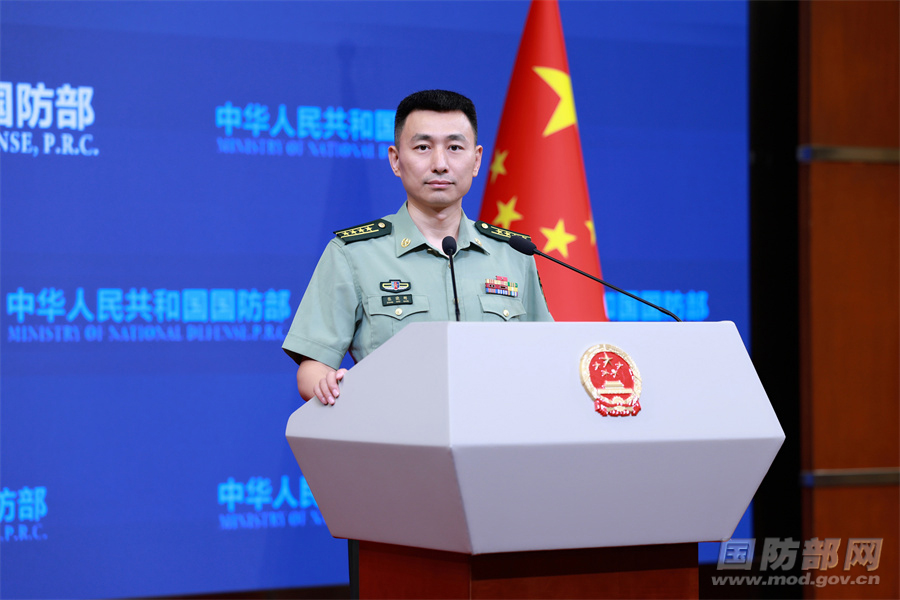
Senior Colonel Zhang Xiaogang, spokesperson for the Ministry of National Defense (MND) of the People's Republic of China (PRC), answers recent media queries concerning the military on the afternoon of August 16, 2024. (mod.gov.cn/Photo by Lv Zhe)
Question: At a recent group study session of the Political Bureau of the CPC Central Committee, President Xi Jinping emphasized that the military must understand new circumstances, characteristics and requirements of border, coastal and air defense (BCAD), and strive to build a modern system of strong and secure BCAD through innovative thinking and measures. What steps will the military take to deliver on this instruction?
Zhang Xiaogang: Before the 97thanniversary of the founding of the PLA, the Political Bureau of the CPC Central Committee held the 16th group study session on building a modern system of BCAD. In his speech delivered at the session, President Xi Jinping underscored that the military must follow the Thought on Socialism with Chinese Characteristics for a New Era, focus on the overall national security and military strategy, and give full consideration toboth domestic and international imperatives. President Xi also stressed that we need to adapt to the new circumstances, characteristics and requirements in BCAD, reinforce our sense of mission and responsibility, foster new ideas and measures, and make solid efforts to build a modern system of strong and secure BCAD.
Advancing a modern system of BCAD is an inherent requirement of defense and military modernization, and ensuring high-quality development through high-level security. It is of great importance for building a strong country and advancing national rejuvenation through Chinese modernization. Firstly, we must strengthen the centralized and unified leadership of the CPC Central Committee, enhance the synergy among the Party, the government, the military, the police force, and the people in reinforcing border defense, and better coordinate the command and operations of the military, the police force, and the people. Only by acting in unison can we improve our overall border defense capability. Secondly, we must implement the guiding principles of the third plenary session of the 20th CPC Central Committee, study major issues concerning BCAD, and deepen reform while conducting daily work so as to make continuous improvement. We need to optimize relevant mechanisms of leadership and management, and to improve legal systems to ensure orderly and efficient work concerning BCAD. Thirdly, we must step up the application of technologies to develop new approaches and conditions for BCAD, and put in place a multi-layered intelligent management and control system. Fourthly, we must have better coordination between military and civilian agencies in terms of general planning, distribution of work and arrangement of resources in strengthening BCAD. The connectivity, joint construction and sharing of infrastructure should be enhanced to establish a BCAD system that is able to safeguard security and support development. Fifthly, we must strengthen good-neighborliness and practical cooperation with relevant countries to create a favorable neighborhood environment for developing BCAD.
Question: President Xi Jinping recently held talks with President José Ramos-Horta of the Democratic Republic of Timor-Leste. The two countries issued a joint statement agreeing to enhance exchanges at different levels between the two militaries. Please tell us more about the mil-to-mil relations between China and Timor-Leste.
Zhang Xiaogang: At the invitation of President Xi Jinping, President José Ramos-Horta of the Democratic Republic of Timor-Leste paid a state visit to China. Since the establishment of diplomatic ties, the two countries have always treated each other with sincerity and supported each other at times of need. China and Timor-Leste have shown how countries with different political systems, development levels, history and cultures can achieve mutual respect, peaceful co-existence and common development. In recent years, the two militaries have maintained friendly exchanges and cooperation in such areas as high-level engagements, personnel training and equipment and technology. Going forward, the two countries will deepen cooperation in areas including institutionalized exchanges, and joint exercises and training to enrich and broaden the comprehensive strategic partnership between the two countries.
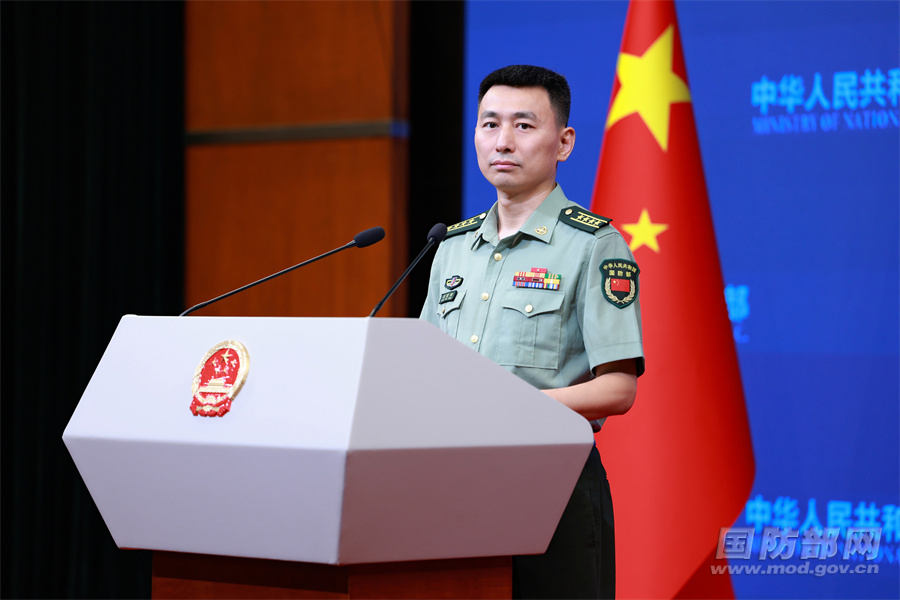
Senior Colonel Zhang Xiaogang, spokesperson for the Ministry of National Defense (MND) of the People's Republic of China (PRC), answers recent media queries concerning the military on the afternoon of August 16, 2024. (mod.gov.cn/Photo by Lv Zhe)
Question: At their recent "2+2" Ministerial Meeting, the US and Japan announced the reconstitution of the US Forces Japan (USFJ) and expressed concerns over China's ongoing and rapid expansion of its nuclear weapons arsenal. Lloyd Austin, US Secretary of Defense, said at the first US-Japan Ministerial Meeting on Extended Deterrence that "extended deterrence" is at the core of US-Japan alliance. Do you have any comment?
Zhang Xiaogang: The US and Japan recently have been playing up the so-called "China military threat" to make up excuses for closer military ties. Such acts provoke bloc confrontation and undermine regional peace and stability. We are firmly opposed to that.
As we all know, the US poses the biggest nuclear threat to the world. In possession of the largest nuclear arsenal in the world, the US follows a nuclear policy that allows first-use of nuclear weapons. In recent years, the US has invested heavily to miniaturize nuclear weapons, lowering the threshold of their use in real-combat, and used nuclear weapons as a bait to hijack its allies and partners. Its irresponsible decisions and actions have resulted in the proliferation of nuclear risks, and its attempts to maintain hegemony and intimidate the world with nuclear power have been fully exposed. As the only country victimized by nuclear strikes, Japan is not learning lessons from history, but panders to the US to gain the so-called "nuclear deterrence". This will only exacerbate regional tensions and increase the risk of nuclear proliferation and nuclear conflicts.
China pursues a nuclear strategy of self-defense, and is committed to the policy of no first use of nuclear weapons. China does not engage in any nuclear arms race with any other country, and keeps its nuclear capabilities at the minimum level required for national security. Countries that do not use or threaten to use nuclear weapons against China will never be threatened by China's nuclear weapons. We urge the US and Japan to abandon their Cold-War mentality, recognize that a nuclear war cannot be won and must never be fought, reduce the role of nuclear weapons in national and collective security policies, and take concrete actions to promote global strategic stability, instead of doing the opposite.
Question: It is reported that the Chinese and Russian navies recently held a joint exercise at the Gulf of Finland. Some media outlets commented that the joint exercise not only showcased strength, but also sent a warning to NATO. Please comment on that.
Zhang Xiaogang: Not long ago, PLANS Jiaozuo and PLANS Honghu participated in the celebrations marking the 328th anniversary of the founding of the Russian navy, and joined Russian vessels for an exercise at the Gulf of Finland. PLANS Jiaozuo and a Russian frigate conducted drills on such subjects as light weapon shooting, replenishment-at-sea, and joint search and rescue. PLANS Honghu and a Russian landing ship patrolled the surrounding waters during the exercise. It needs to be emphasized that the joint exercise is a routine arrangement between Chinese and Russian militaries. It complies with international law and norms, does not target any specific entity, and has nothing to do with the current regional situation.
Question: The US recently announced a US$500 million military aid to the Philippines, claiming to help the Philippine side respond to the China Coast Guard and "maritime militia". In addition, Japan recently held a joint military exercise with the Philippines in the so-called "exclusive economic zone of the Philippines". The activity was said to help realize "a free and open Indo-Pacific". What's your comment?
Zhang Xiaogang: The Chinese side believes that defense cooperation between countries should not target any third party or disrupt regional peace and stability. However, some outside countries, such as the US and Japan, keep stirring up troubles and muddying the waters in the South China Sea. The Philippines are inviting wolves into the house and willingly acting as their pawns, which is despised by other regional countries. It needs to be emphasized that China has indisputable sovereignty over Nanhai Zhudao and its adjacent waters. We will take legitimate countermeasures against deliberate infringements and provocations to protect our territorial sovereignty and maritime rights and interests.
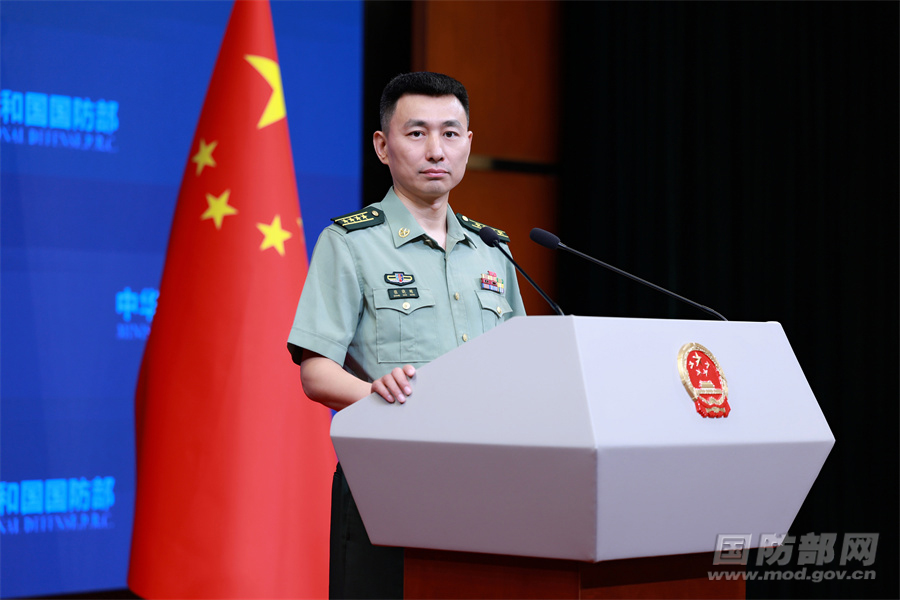
Senior Colonel Zhang Xiaogang, spokesperson for the Ministry of National Defense (MND) of the People's Republic of China (PRC), answers recent media queries concerning the military on the afternoon of August 16, 2024. (mod.gov.cn/Photo by Lv Zhe)
Question: It's reported that the US, the Philippines, Australia and Canada recently carried out a joint patrol in the South China Sea. The four countries said in a joint statement that they stood together to address common maritime challenges, and to uphold international law and the rules-based order. Meanwhile, the PLA Southern Theater Command held joint naval and air combat patrols near Huangyan Dao. What's your comment?
Zhang Xiaogang: Huangyan Dao is part of China's inherent territory. The spokesperson for the PLA Southern Theater Command has released information on the joint naval and air combat patrols near Huangyan Dao. Such patrols are legitimate operations to protect our rights and interests, respond to contingencies and preserve regional stability.
The South China Sea is a shared home for countries in the region, not a hunting ground for external forces. In breach of the spirit of the DOC, the Philippines colluded with outside countries to carry out joint patrols in the South China Sea, undermining regional peace and stability. Such acts will find no support, no matter how sugarcoated. Some outside countries, the US in particular, often say one thing while doing the other, and take a selective approach to international law and rules, utilizing or discarding them as they see fit. It is because they are ganging up and provoking troubles that the South China Sea cannot be tranquil. The Chinese side will continue to take firm and necessary measures against provocations that violate China's sovereign rights and interests and harm regional stability.
Question: It's reported that the DPP authorities may once again request to buy E-2D airborne early warning (AEW) aircraft from the US. In addition, Taiwan's defense mission to the US recently signed with the American Institute in Taiwan (AIT) the standard draft on the Advanced Tactical Data Link System Upgrade Planning, aiming at enhancing data link systems of Taiwan's troops such as command and control systems. Do you have any comment?
Zhang Xiaogang: The DPP authorities are buying weapons with hard-earned money of the Taiwan people. It is an act of complete betrayal detrimental to the interests of the people in Taiwan, and is nothing more than pandering to the US and seeking self-consolation.
We firmly oppose any official US interaction and military contact with China's Taiwan region. We urge the US side to truly abide by the one-China principle and three China-US joint communiqués, honor its commitment of not supporting "Taiwan independence", stop arming Taiwan, and work with the Chinese side to maintain peace and stability across the Taiwan Strait.


